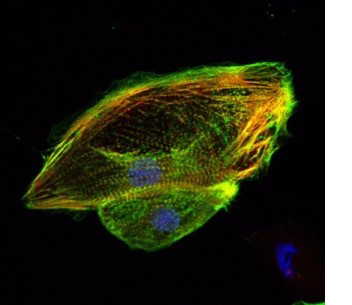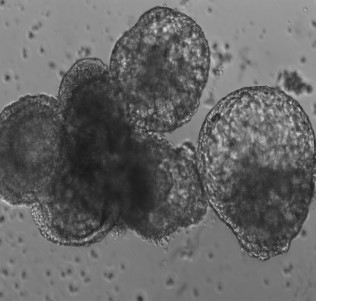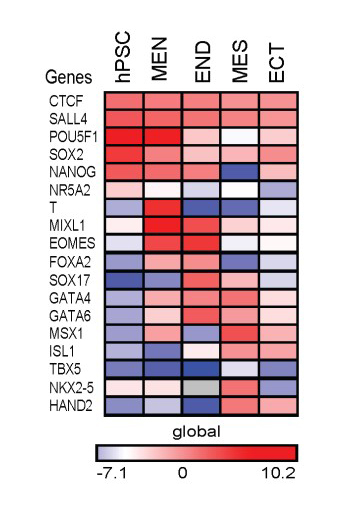Xiaoping Bao
William K. Luckow Associate Professor
Purdue University
School of Chemical Engineering
Forney Hall of Chemical Engineering
480 Stadium Mall Drive
West Lafayette, IN 47907-2100
Research Interests
The major research interest in the Bao lab is to use innovative technologies to engineer stem cells as models of human development and disease, as well to develop cellular and molecular therapies as next-generation of medicine for degenerative diseases, including neurological disorders, heart diseases, β cells for diabetes, T cells for cancers, et al. Our specific interests include:
Stem cell differentiation and biomanufacturing

Human disease modeling and gene editing

Bioinformatives and computational biology

Research Group
Graduate Students
- Yibo Xu
Research Associates
- Open Positions: Prospective students and postdoctoral candidates with a background in bioengineering, cell and molecular biology, animal models, or other related area are encouraged to apply. Undergraduate students, exchange students or scholars are also welcome to join the lab. If you are interested, please send your CV to Dr. Bao at bao61@purdue.edu.
Awards and Honors
Selected Publications
Jiang Y, Zhou Y, Bao X, Chen C, Randolph LN, Du J, Lian XL. An Ultrasensitive Calcium Reporter System via CRISPR-Cas9-Mediated Genome Editing in Human Pluripotent Stem. iScience . 2018 Nov 30;9:27-35. doi: 10.1016/j.isci.2018.10.007.
Qian T, Maguire SE, Canfield SG, Bao X, Olson WR, Shusta EV, Palecek SP. Directed differentiation of human pluripotent stem cells to blood-brain barrier endothelial cells. Sci Adv. 2017 Nov 3;(11):e1701679. doi: 10.1126/sciadv.1701679.
Bao X, Lian X, Qian T, Bhute VJ, Han T, Palecek SP. Directed differentiation and long-term maintenance of epicardial cells derived from human pluripotent stem cells under fully defined conditions. Nat Protoc. 2017 Sep 12;(9):1890-1900. doi: 10.1038/nprot.2017.080.
Bao X, Bhute VJ, Han T, Qian T, Lian X, Palecek SP. Human pluripotent stem cell-derived epicardial progenitors can differentiate to endocardial-like endothelial cells. Bioeng Transl Med. 2017 Jun;2;(2): 191-201. doi: 10.1002/btm2.10062.
Bhute VJ, Bao X, Dunn KK, Knutson KR, McCurry EC, Jin G, Lee WH, Lewis S, Ikeda A, Palecek SP. Metabolomics Identifies Metabolic Markers of Maturation in Human Pluripotent Stem Cell-Derived Cardiomyocytes. Theranostics 2017 7;(7):2078-2091. doi: 10.7150/thno.19390.
Bao X, Lian X, Hacker TA, Schmuck EG, Qian T, Bhute VJ, Han T, Shi M, Drowley L, Plowright A, Wang QD, Goumans MJ, Palecek SP. Long-term self-renewing human epicardial cells generated from pluripotent stem cells under defined xeno-free conditions. Nat Biomed Eng. 2016 1; doi: 10.1038/s41551-016-0003.
Lian X, Bao X, Zilberter M, Westman M, Fisahn A, Hsiao C, Hazeltine LB, Dunn KK, Kamp TJ, Palecek SP. Chemically defined, albumin-free human cardiomyocyte generation. Nat Methods. 2015 Jul:12(7): 595-6. doi: 10.1038/nmeth.3448.
Bao X, Lian X, Dunn KK, Shi M, Han T, Qian T, Bhute VJ, Canfield SG, Palecek SP. Chemically-defined albumin-free differentiation of human pluripotent stem cells to endothelial progenitor cells. Stem Cell Res. 2015 Jul:15(1): 122-129. doi: 10.1016/j.scr.2015.05.004. (F1000Prime).
Patents
"Methods for epicardial differentiation of human pluripotent stem cells", Palecek SP, Bao X, Lian X., US Patent, US10131878B2 (2018).
"Chemically defined albumin-free conditions for cardiomyocyte differentiation of human pluripotent stem cells", Palecek SP, Lian X, Bao X., US Patent, US9765299 B2 (2017).
"Simplified methods for generating endothelial cells from human pluripotent stem cells under defined conditions:, Palecek SP, Lian X, Bao X., US Patent, US9290741 B2 (2016).
